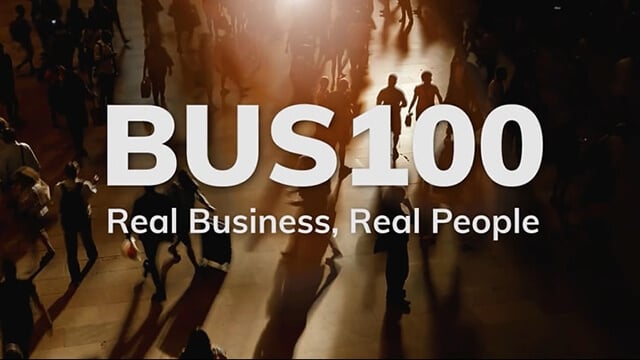Here’s a no-cost way to complete gen eds. Get details
Bachelor of Science Health Services Administration
PROGRAM AT A GLANCE
Bachelor of Science in Health Services Administration
Get set to make a difference in the health care field with this online program. You’ll discover where technology and innovation meet business and health services. Courses cover the fundamentals of business, accounting and health services administration and management.
Build your expertise in healthcare operations
Get ready to pursue career opportunities in health services management. With a Bachelor of Science (BS) Health Services Administration from Strayer, you’ll be armed with a broad understanding of business and accounting. You’ll dive into core areas of administration and management, equipping you with skills in medical terminology, electronic health records and data quality and systems. And you could have the opportunity to earn certificates and professional digital badges as you complete the coursework.*
- Undergraduate Certificate in Public Heath
- Undergraduate Certificate in Health Information Management and Analytics
- Foundations of Healthcare Finance Badge
- Foundations of Electronic Medical Records Badge
- Healthcare Office Administration Badge
- Healthcare Operations Management Badge
*Certificates and badges are based on a five-year program sequence. Students are not required to follow this sequence.
Explore Bachelor of Science Health Services Administration concentrations
At Strayer, we offer our students professionally aligned concentrations, allowing you to customize learning to support your interests and career goals. If you can’t decide, your admissions officer is here to help.
Find the concentration that best meets your goals:
Earn your degree from an accredited university
Strayer University is an accredited institution and a member of the Middle States Commission on Higher Education (MSCHE or the Commission) www.msche.org. Strayer University’s accreditation status is Accreditation Reaffirmed. The Commission’s most recent action on the institution’s accreditation status on June 22, 2017 was to reaffirm accreditation. MSCHE is recognized by the U.S. Secretary of Education to conduct accreditation and pre-accreditation (candidate status) activities for institutions of higher education including distance, correspondence education, and direct assessment programs offered at those institutions. The Commission’s geographic area of accrediting activities is throughout the United States.

Types of BSHS programs at Strayer
We offer 6 concentrations in our BSHS program. Find the one that supports your educational and career goals. If you can’t decide, your admissions officer is here to help.
Estimate the cost of your degree
How much does a bachelor’s in health services administration cost?
Estimate the cost of your degree
How much does a bachelor’s in health services administration cost?
Expected Graduation
...
Approximate Total
...
*Student is required to take two courses per quarter during disbursement period
PREPARING YOUR RESULTS
Time commitment
Calculate the approximate time commitment of your degree.
| Course load | ... courses/term |
| Classroom time | ... hours/week |
| Terms per year | ... terms |
| Terms to graduation | ... terms |
Cost analysis
Calculate the approximate cost of your degree
| Tuition | ... |
| Books | ... |
| Fees | ... |
| No-cost gen ed | $0 |
| Transfer credits | ... |
| Transfer Credit Scholarship | $0 |
| $4K scholarship | $0 |
| Strayer Learn and Earn Scholarship | $0 |
| Approximate total | ... |
Program cost breakdown
In most cases, Strayer’s BSHS program consists of 40 courses, with the price of $1525 per course. There are additional fees for textbooks and supplies, a $65 technology fee each term and a one-time $150 degree conferral fee.
Transfer credits
Courses from another institution may be eligible for transfer to Strayer, which can reduce the number of courses you need to graduate and your overall tuition. Bachelor’s students can transfer up to 28 classes toward the bachelor’s degree (if approved). Strayer’s transfer credit page has more information as well as a tool to estimate how many transfer credits you may be able to apply to your Strayer degree program.
Scholarships and financial aid
This program is currently not approved for federal financial aid by the U.S. Department of Education (ED).
There are a number of financial aid options worth exploring on our financial aid page. To apply for federal aid, prospective students should fill out the Free Application for Federal Student Aid (FAFSA) form. Stafford loans are available for graduate study. These are direct unsubsidized loans, not based on financial need. Unlike subsidized loans, Stafford loan interest will accrue while in the program. Making interest payments while in school will help reduce the amount of principal that would otherwise build up, reducing your end cost.
There are also scholarships and private loans available for Strayer students.
More than 500 organizations – including corporations and community colleges – invest in their employees by working with Strayer University to offer access to discounted education programs. If your employer is a Corporate Alliance Partner, you may qualify for education benefits that can help you discover career and educational pathways related to your field.
Private loans
Non-federal loans may pay the difference between the cost of attendance and the total of loans and grants received from other tuition assistance programs. The terms and conditions of federal loans are often more favorable than private loans and should be considered before exploring private loans.
Military tuition assistance
Scholarships are offered to eligible students currently serving in the military, as well as military spouses. Strayer is also approved by Veterans Affairs to accept and process veteran education benefits. Learn more about the Strayer University active military assistance program here.
Veteran benefits
In addition to participating fully in the Yellow Ribbon Program, Strayer is approved by Veterans Affairs to accept and process veteran education benefits. Student veterans can receive transfer credit for military training and life experiences.
BSHS course list
All BSHS students take a set list of required major courses. All students also take a set of general education classes for a well-rounded education. The remaining credits come from their choice of concentration. View all courses
Sample courses

Provides a foundation in today's business operations with a focus on the major functions of a business (management, production, marketing, finance and accounting, human resource management, and various support functions). The course also provides an overview of business organizations and the competitive business environment, strategic planning, international business, ethical considerations, quality assurance and more.

Being an effective communicator is an essential skill for any profession. In this course, you will learn the secrets to writing, listening, and speaking with credibility in order to share your voice with the world.
This course will provide a broad overview of the field of Health Services Administration as related to the U.S. health care system. Students will gain an understanding of the healthcare delivery system and its components. Topics will include history, development, planning, organization, finance, quality, management and leadership, as well as major policy issues and trends in the field of Health Services Administration, with an emphasis on innovative problem solving.
This course is intended to equip future healthcare administrators and leaders with a basic understanding of medical terminology and best practices to communicate effectively across the healthcare system using appropriate terminology. Topics include anatomical structure, medical treatment, and medical procedural terminology used across healthcare settings. Prerequisite: HSA 110
This course introduces students to the key economic and financial concepts related to healthcare management. Topics include economic influences of the healthcare delivery and the role in planning and decision making, demand and supply-side factors, planning and budgeting concepts, financial management, cost accounting and management, payment/reimbursement models, the differences between the goods and service industries, as well as the pros and cons of a single payer system. Prerequisite: ACC 100 & HSA 110
This course explores ethical issues and situations relevant to health services administrators and contemporary health care organizations. Students will acquire the knowledge and skills needed to make ethical decisions. A broad range of topics are explored including patient-centered issues, public health ethics, ethical practices around contracts and reimbursement, confidentiality of patient medical records, market and obligation to the community. Prerequisite: HSA 110
Bachelor of Health Services Administration admission requirements
Before you can pursue your bachelor’s degree, you’ll need to enroll at Strayer. Here’s what you’ll need to get started for admission to the university.
Learn more about the admission process at Strayer. Students applying to Washington, D.C., or New Jersey campuses must provide proof of proper immunization.
Transferring to Strayer from another university?
Some or all of the credits you’ve earned may be transferable.
International students
We welcome international students.
Campus locations
Come to a campus near you for guidance and support. You’ll have access to helpful resources, a supportive community and plenty of spaces to learn and grow.
Ready to take the next step?
Your admissions officer is here to guide you through every step of the process, from completing your application to choosing your concentration.